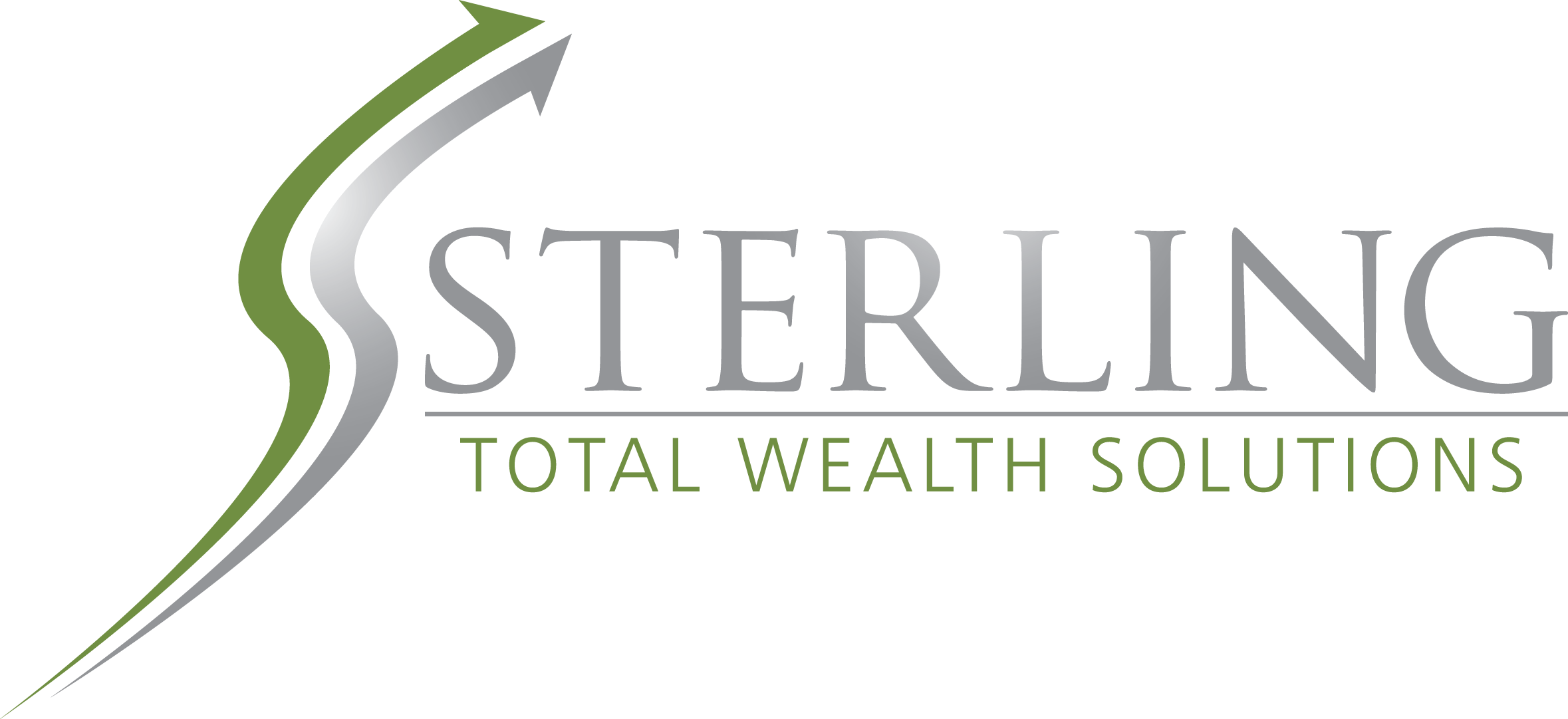In this month’s recap: Stocks moved higher as investors looked past accelerating inflation and the Fed’s pivot on monetary policy.
Monthly Economic Update
Monthly Economic Update | Presented by Sterling Total Wealth Solutions | July 2021
Click here to receive Economic Updates in your Inbox: Subscribe
U.S. Markets
Stocks moved higher last month as investors looked past accelerating inflation and the Fed’s pivot on monetary policy.
The Dow Jones Industrial Average slipped 0.07 percent, but the Standard & Poor’s 500 Index rose 2.22 percent. The Nasdaq Composite led, gaining 5.49 percent.1
Inflation Report
The May Consumer Price Index came in above expectations. Prices increased by 5 percent for the year-over-year period—the fastest rate in nearly 13 years. Despite the surprise, markets rallied on the news, sending the S&P 500 to a new record close and the technology-heavy Nasdaq Composite higher.2
Fed Pivot
The Fed indicated that two interest rate hikes in 2023 were likely, despite signals as recently as March 2021 that rates would remain unchanged until 2024. The Fed also raised its inflation expectations to 3.4 percent, up from its March projection of 2.4 percent. This news unsettled the markets, but the shock was short-lived.3
News-Driven Rally
In the final full week of trading, stocks rallied on the news of an agreement regarding the $1 trillion infrastructure bill and reports that banks had passed the latest Federal Reserve stress tests.
Sector Scorecard
Industry sector performance was mixed. Gains were realized in Communication Services (+2.96 percent), Consumer Discretionary (+3.22 percent), Energy (+1.92 percent), Health Care (+1.97 percent), Real Estate (+3.28 percent), and Technology (+6.81 percent). Losses were suffered in Consumer Staples (-1.95 percent), Financials (-3.84 percent), Industrials (-3.34 percent), Materials (-5.92 percent), and Utilities (-2.78 percent).4
What Investors May Be Talking About in July
Second-quarter earnings season is near, and investors will see whether Corporate America can build upon its first-quarter results.
Earnings are expected to increase 61 percent, in part driven by a nearly 20 percent growth in sales. In the first quarter, earnings rose 52 percent on an 11 percent increase in sales.5
First-quarter earnings didn’t move the market, so it’s uncertain whether second-quarter numbers will be a catalyst.
But if earnings miss the mark, analysts may find themselves evaluating stock valuations over the next few months.
World Markets
Overseas markets were mixed in June, with the MSCI EAFE Index falling 0.33 percent.6
European markets, however, edged higher. France picked up 0.93 percent, Germany tacked on 0.71 percent, and the U.K. rose 0.21 percent.7
In the Pacific Rim, Australia was among the standouts, gaining 2.11 percent. Hong Kong lost 1.11 percent, and Japan dropped 0.53 percent.8
Indicators
Gross Domestic Product: The final reading of first-quarter GDP growth was unchanged at 6.4 percent.9
Employment: Nonfarm payrolls increased by 559,000, dropping the unemployment rate to 5.8 percent. The leisure and hospitality sector experienced the largest gain, with 292,000 jobs added.10
Retail Sales: Retail sales declined 1.3 percent in May as consumers shifted their spending from goods to services such as airline travel.11
Industrial Production: Output at America’s factories, mines, and utilities rose 0.8 percent. It was the third consecutive month of expanded output.12
Housing: Housing starts rose 3.6 percent as the high cost of materials hampered activity.13
Existing home sales dropped for the fourth consecutive month, sliding 0.9 percent in May. Inventory shortages and declining affordability continue to weigh on the market.14
Sales of new homes fell 5.9 percent as the median sales price rose to a record $374,400.15
Consumer Price Index: The prices of consumer goods surged in May, hitting levels not seen in almost 13 years. The CPI rose 0.6 percent from April 2021.16
Durable Goods Orders: Orders for long-lasting goods rose 2.3 percent, which represented the largest month-over-month gain since July 2020.17
TIP OF THE MONTH

Cancel monthly charges for services or products you really don’t use or need. If you decide you do need them, you can always sign up for them again later.
The Fed
Following its June meeting, the Federal Open Market Committee indicated that two interest rate hikes in 2023 were likely. The Fed also raised its inflation expectations to 3.4 percent, up from its March projection of 2.4 percent.18
However, Fed officials continue to maintain that price increases will be transitory even though there has been no indication of when or by how much the Fed may begin tapering its monthly bond purchases.18
|
MARKET INDEX |
Y-T-D CHANGE |
June 2021 |
|
DJIA |
12.73% |
-0.07% |
|
NASDAQ |
12.54% |
5.49% |
|
S&P 500 |
14.41% |
2.22% |
|
|
||
|
BOND YIELD |
Y-T-D |
June 2021 |
|
10 YR TREASURY |
0.52% |
1.44% |
Sources: Yahoo Finance, June 30, 2021
The market indexes discussed are unmanaged and generally considered representative of their respective markets. Individuals cannot directly invest in unmanaged indexes. Past performance does not guarantee future results. U.S. Treasury Notes are guaranteed by the federal government as to the timely payment of principal and interest. However, if you sell a Treasury Note prior to maturity, it may be worth more or less than the original price paid.
QUOTE OF THE MONTH

“Never be limited by other people’s limited imaginations.”
Dr. Mae Jemison
THE MONTHLY RIDDLE

You stand 8’ away from a door. With each move, you advance half the distance to the door. How many moves will it take to reach the door?
LAST MONTH’S RIDDLE: A zookeeper has a certain number of cages and a certain number of tigers. If she puts one tiger in each cage, she has one tiger too many. If she puts two tigers in each cage she has one cage too many. How many tigers and cages does she have?
ANSWER: She has three cages and four tigers.
Securities offered through Registered Representatives of Cambridge Investment Research, Inc., a Broker/Dealer, Member FINRA/SIPC. Advisory services offered through Cambridge Investment Research Advisors, Inc., a Registered Investment Advisor. Sterling Total Wealth Solutions and Cambridge are not affiliated.
To learn more about Sterling Total Wealth Solutions, visit us on the web at www.sterlingtotalwealthsolutions.com
Know someone who could use information like this? Please feel free send us their contact information via phone or email. (Don’t worry – we’ll request their permission before adding them to our mailing list.)
This material was prepared by MarketingPro, Inc., and does not necessarily represent the views of the presenting party, nor their affiliates. The information herein has been derived from sources believed to be accurate. Please note – investing involves risk, and past performance is no guarantee of future results. Investments will fluctuate and when redeemed may be worth more or less than when originally invested. This information should not be construed as investment, tax or legal advice and may not be relied on for the purpose of avoiding any Federal tax penalty. This is neither a solicitation nor recommendation to purchase or sell any investment or insurance product or service, and should not be relied upon as such. All market indices discussed are unmanaged and are not illustrative of any particular investment. Indices do not incur management fees, costs, or expenses. Investors cannot invest directly in indices. All economic and performance data is historical and not indicative of future results. The Dow Jones Industrial Average is a price-weighted index of 30 actively traded blue-chip stocks. The NASDAQ Composite Index is a market-weighted index of all over-the-counter common stocks traded on the National Association of Securities Dealers Automated Quotation System. The Standard & Poor’s 500 (S&P 500) is a market-cap weighted index composed of the common stocks of 500 leading companies in leading industries of the U.S. economy. The Russell 2000 Index measures the performance of the small-cap segment of the U.S. equity universe. The CBOE Volatility Index® (VIX®) is a key measure of market expectations of near-term volatility conveyed by S&P 500 stock index option prices. NYSE Group, Inc. (NYSE:NYX) operates two securities exchanges: the New York Stock Exchange (the “NYSE”) and NYSE Arca (formerly known as the Archipelago Exchange, or ArcaEx®, and the Pacific Exchange). NYSE Group is a leading provider of securities listing, trading and market data products and services. The New York Mercantile Exchange, Inc. (NYMEX) is the world’s largest physical commodity futures exchange and the preeminent trading forum for energy and precious metals, with trading conducted through two divisions – the NYMEX Division, home to the energy, platinum, and palladium markets, and the COMEX Division, on which all other metals trade. The SSE Composite Index is an index of all stocks (A shares and B shares) that are traded at the Shanghai Stock Exchange. The CAC-40 Index is a narrow-based, modified capitalization-weighted index of 40 companies listed on the Paris Bourse. The FTSEurofirst 300 Index comprises the 300 largest companies ranked by market capitalisation in the FTSE Developed Europe Index. The FTSE 100 Index is a share index of the 100 companies listed on the London Stock Exchange with the highest market capitalization. Established in January 1980, the All Ordinaries is the oldest index of shares in Australia. It is made up of the share prices for 500 of the largest companies listed on the Australian Securities Exchange. The S&P/TSX Composite Index is an index of the stock (equity) prices of the largest companies on the Toronto Stock Exchange (TSX) as measured by market capitalization. The Hang Seng Index is a free float-adjusted market capitalization-weighted stock market index that is the main indicator of the overall market performance in Hong Kong. The FTSE TWSE Taiwan 50 Index is a capitalization-weighted index of stocks comprises 50 companies listed on the Taiwan Stock Exchange developed by Taiwan Stock Exchange in collaboration with FTSE. The MSCI World Index is a free-float weighted equity index that includes developed world markets and does not include emerging markets. The Mexican Stock Exchange, commonly known as Mexican Bolsa, Mexbol, or BMV, is the only stock exchange in Mexico. The U.S. Dollar Index measures the performance of the U.S. dollar against a basket of six currencies. Additional risks are associated with international investing, such as currency fluctuations, political and economic instability and differences in accounting standards. This material represents an assessment of the market environment at a specific point in time and is not intended to be a forecast of future events, or a guarantee of future results. MarketingPro, Inc. is not affiliated with any person or firm that may be providing this information to you. The publisher is not engaged in rendering legal, accounting or other professional services. If assistance is needed, the reader is advised to engage the services of a competent professional.
CITATIONS:
- The Wall Street Journal, June 30, 2021
- CNBC.com, June 10, 2021
- The Wall Street Journal, June 16, 202
- Sectorspdr.com, May 31, 2021
- FactSet.com, June 4, 2021
- MSCI.com, June 30, 2021
- MSCI.com, June 30, 2021
- MSCI.com, June 30, 2021
- CNBC.com, June 24, 2021
- The Wall Street Journal, June 4, 2021
- The Wall Street Journal, June 15, 2021
- MarketWatch.com, June 15, 2021
- CNBC.com, June 16, 2021
- CNBC.com, June 22, 2021
- FoxBusiness.com, June 23, 2021
- The Wall Street Journal.com, June 10, 2021
- CNBC.com, June 24, 2021
- The Wall Street Journal, June 16, 2021
